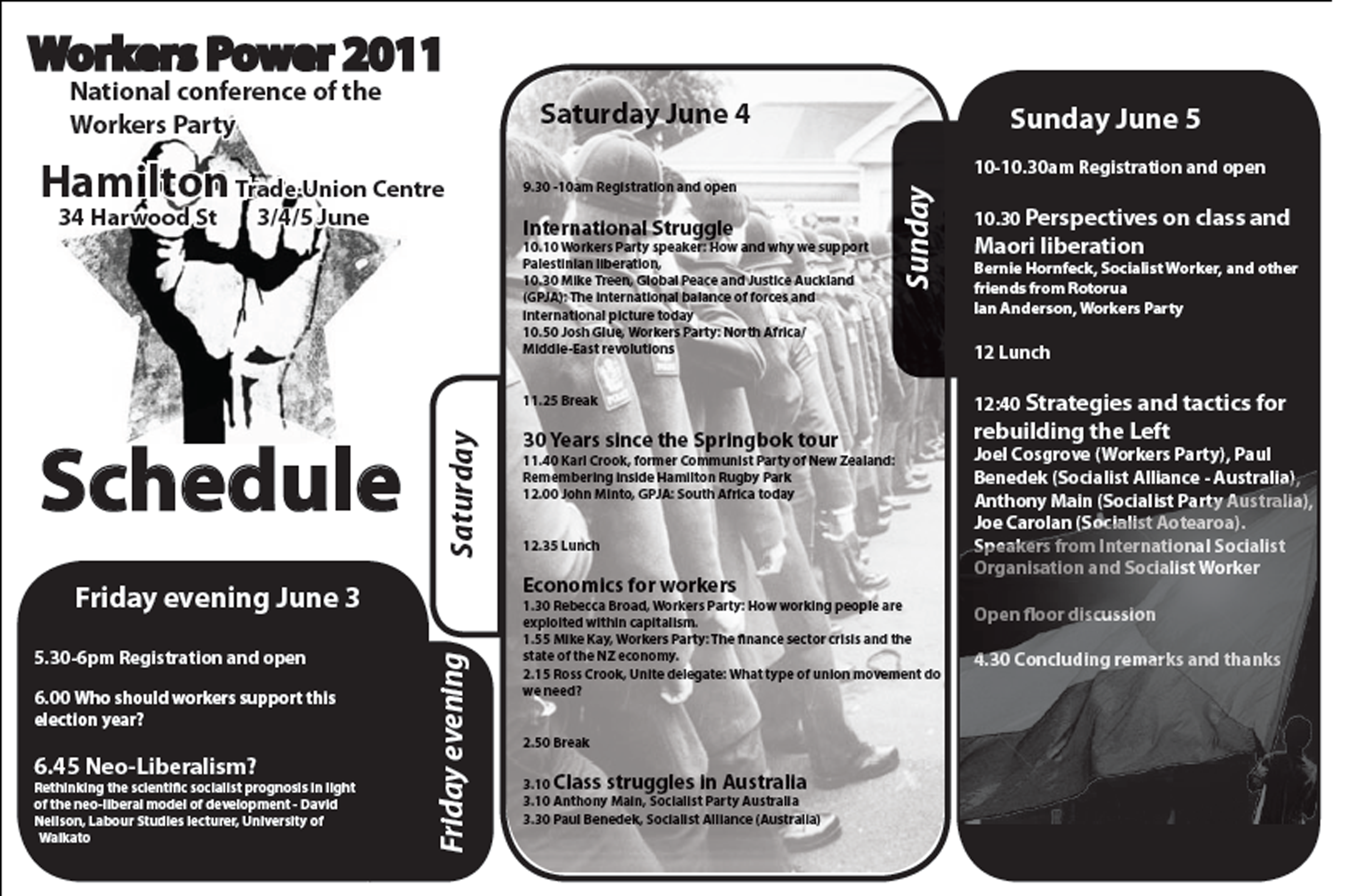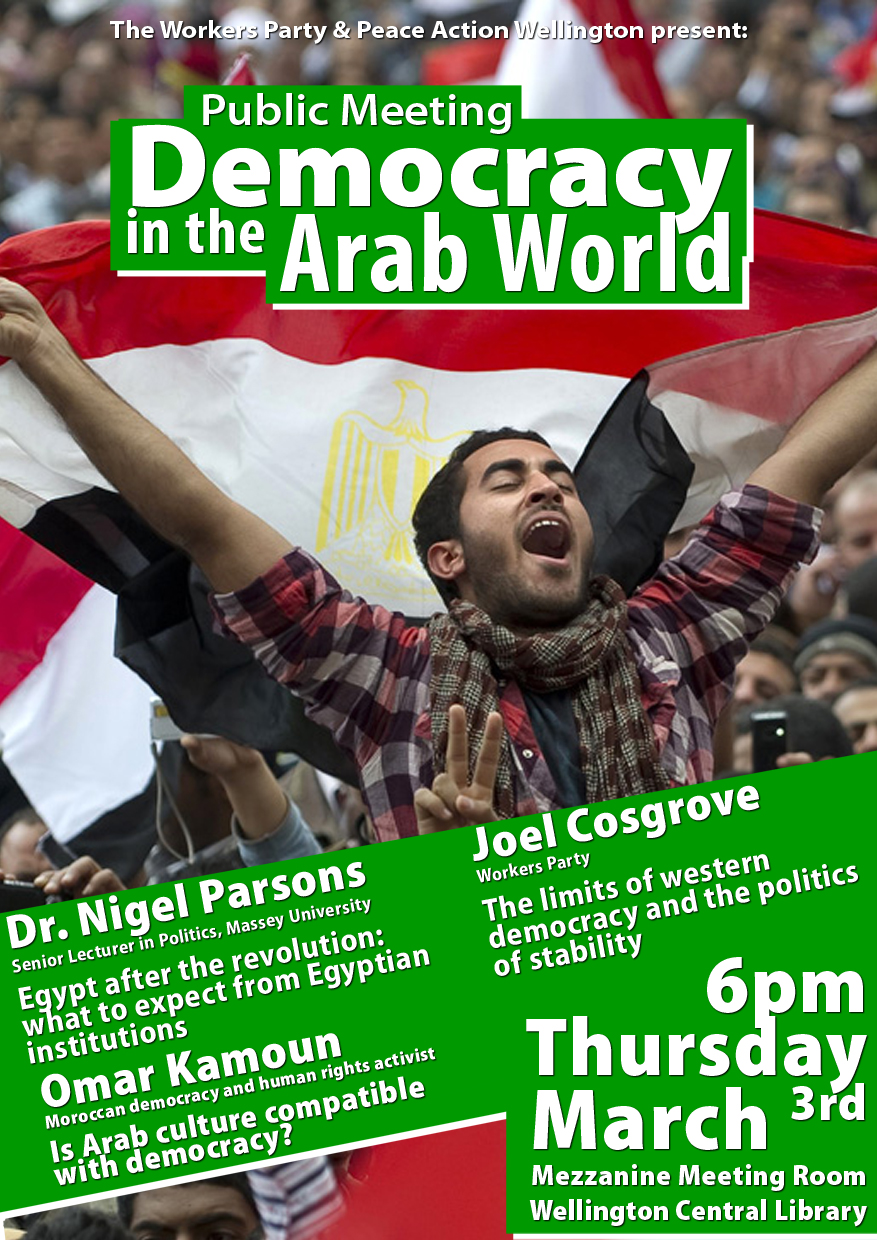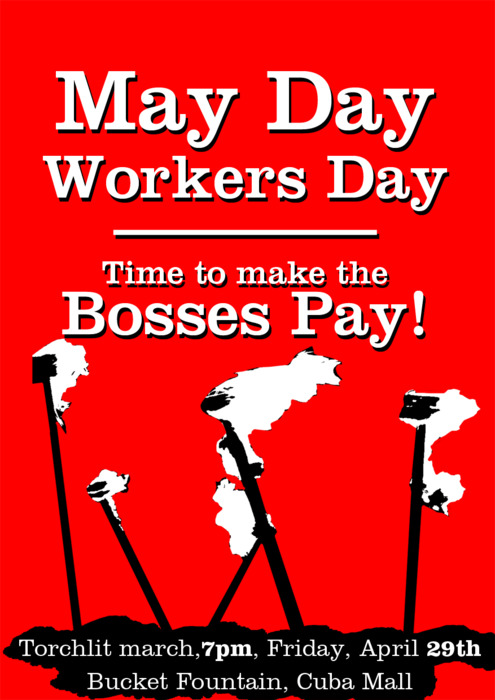 Torchlit march, 7pm, Friday, April 29th 2011
Torchlit march, 7pm, Friday, April 29th 2011
March on parliament starting Cuba Mall bucket fountain
Earthquake results in disaster for Japanese people
Rebecca Broad, Workers Party National Organiser
A magnitude nine earthquake and consequent 23 ft tidal wave, occurring 70km off the northeast coast of Japan March 11, has caused severe and extensive damage to that country. The three prefectures or states of Miyagi, Fukushima, and Iwate have sustained the most damage and loss of life. Multiple coastal towns have been completely destroyed by the tsunami. The Japanese military is heading up the recovery operation with 100,000 troops mobilised. The Ministry of Health, Labor and Welfare estimates that 2.5 million households could be affected, and 1.6 million houses over 11 prefectures have no access to clean water. The number of estimated deaths and officially missing on March 21 was respectively 18,000 and 9,200, according to the National Police Agency. However both of those amounts are expected to continue rising. Nearly 500,000 people are living in emergency shelters and around 22,000 people have been saved by rescuers so far.
Continue reading “Earthquake results in disaster for Japanese people”
Play review: Mates and Lovers
Adapted by Ronald Trifero Nelson from a script by Chris Brickell, review by Workers Party member James Froch
 Having significantly evolved since it last showed at Bats in 2009, a new production of Mates and Lovers is back in Wellington as part of the second Asia-Pacific Out Games. This celebration of the modern gay identity is Ronald Nelson’s second adaptation of Chris Brickell’s well- known catalogue of men’s sometimes platonic and sometimes sexual relationships with other men.
Having significantly evolved since it last showed at Bats in 2009, a new production of Mates and Lovers is back in Wellington as part of the second Asia-Pacific Out Games. This celebration of the modern gay identity is Ronald Nelson’s second adaptation of Chris Brickell’s well- known catalogue of men’s sometimes platonic and sometimes sexual relationships with other men.
Having cut, extended and added some scenes—particularly enjoyable was the addition of the young Chris Brickell’s personal experiences during homosexual law reform –this production was more successful than its predecessor at transforming desperate individual stories separated by centuries, geography, ethnicity and class into a single narrative.
Much credit for the easy physical transitions between scenes is due to Taiaroa Royal’s clever choreography. Particularly creative was the transformation of the two lone actors (Paora Taurima and Simon Leary) into chorus girls, and their shirts into halter tops, during the musical numbers often used to move into a new scene. The playful gender transgressions added yet another layer of gaiety to the already quite gay piece of theatre. Continue reading “Play review: Mates and Lovers”
Industrial Tasks and Perspectives December 2010 / Industrial Report
The following article is an edited version of a report submitted to the Workers Party internal conference in January 2011 by its National Industrial officer Mike Kay.
General Outlook
The unemployment rate in the September 2010 year was virtually unchanged since the previous year, at 6.4%. Employment had increased by 1.8%, economic growth had been sluggish,and wage growth generally slow. (Although interestingly enough, the annual survey of CEAs by the Industrial Relations Centre at Victoria University found that for those agreements for which they could calculate an increase from June 2009 to June 2010, adult minimum wages in collectives went up by an “annualised” rate of 4.2 percent – the largest they have ever reported. This has been explained by pay rises kicking in for longer-term agreements negotiated prior to the recession.)
The Department of Labour’s Union Membership Report of March 2009 found a 3.9% increase in union membership on the previous year. Unions represented 17.9% of the total employed labour force, and 21.5% of wage/salary earners for that period. More women (59.9%) than men were union members. The most unionised sector was Health and Community Services, followed by Education; Government Administration and Defence; and Manufacturing.
There was a modest increase in work stoppages in the June 2010 year, compared to 2009’s historic low point. Twenty-nine work stoppages ended in the June 2010 year, with the estimated loss in wages and salaries $3.1 million. The number of employees involved (13,829) and the person-days of work lost (17,989) were both significantly up on the previous year. The greatest participation came from two sectors: Public administration and safety; and Health care and social assistance. The year was notable for strikes amongst white collar workers such as radiographers, secondary school teachers and staff in the Ministry of Justice.
Continue reading “Industrial Tasks and Perspectives December 2010 / Industrial Report”
Workers' Power 2011: National conference of the Workers Party
Major decisions of internal conference
Originally published in the March 2011 issue of The Spark.
At the end of January the Workers Party held its major internal meetings in Christchurch to guide the future strategy of the organisation.
Party structure changes
In terms of changing and developing party structures we did the following:
• Altered the leadership body and renamed it ‘Representative Committee’.
• Combined The Spark production team and the website committee.
• Combined the positions of national organiser and national secretary.
• Elected a discipline and disputes committee.
• Endorsed a new national recruitment officer position within the leadership body.
• Held membership criteria discussion. Membership categories to be fully decided by end of June 6, 2011.
• Held dues/finance discussion. National dues structure to be fully decided by end of June 6, 2011. Continue reading “Major decisions of internal conference”
Videos from Libya
[youtube=http://www.youtube.com/watch?v=d8XQMe8WTBk]
Liberated Libya rejects US intervention
[youtube=http://www.youtube.com/watch?v=w59Ru9jAqIY]
Benghazi Commune – Capital of Libyan revolution!
videos from The Real News Network.
Interview with Joe Carolan: Left alternative gains in Ireland’s general elections
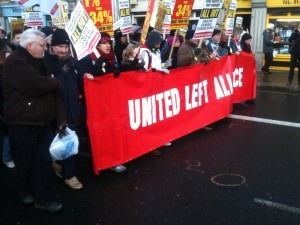 Hailing originally from Ireland where he was active in the Socialists Workers Party, Joe Carolan is a leading member of Socialist Aotearoa. Here he is interviewed by Ian Anderson (Wellington branch of Workers Party and The Spark editorial board).
Hailing originally from Ireland where he was active in the Socialists Workers Party, Joe Carolan is a leading member of Socialist Aotearoa. Here he is interviewed by Ian Anderson (Wellington branch of Workers Party and The Spark editorial board).
The Spark: Could you start by recapping what shifts happened in this year’s Irish General Election?
Joe: Well, to start with there was the complete electoral destruction of the favoured ruling class party Fianna Fail. They lost over 60 seats, including seats they’ve held since they first formed as a constitutional political party. In part this represents the death of nationalist illusions in the party, which had to do with their historical participation in the Civil War. The illusion of Fianna Fail as an upholder of national sovereignty was broken by their sell-out to the IMF and to neoliberalism in general.
Then you had the destruction of the Irish Green Party. The Green Party was exposed in two respects. Firstly they demonstrated that Green Parties are not automatically on the left, similar to Germany where the Greens helped to attack the working class and push through neoliberalism. They also sold out principles of their own, for example their craven surrender to Shell Oil, or the use of Shannon Airport by the US Military. So those two ruling parties lost a lot of ground, and good riddance.
There were significant gains by Fine Gael, the other major ruling class party. The split between the major ruling class parties does not go down left/right lines, and has more to do with the Civil War. Fine Gael came from the tradition of IRA leader Michael Collins, who accepted a free state with partition, while Fianna Fail is associated more with republicanism, the idea of a united Irish state.
Fine Gael is socially liberal, so many liberals treat it as a natural ally. The Labour Party has pursued a strategy of coalitions with Fine Gael.
Sinn Fein, a group broadly associated with left republicanism, has also gained seats – even, to their own surprise, in areas they have never previously held. They’ve grown from 4 seats to 13. The growth of Sinn Fein, the growth of the Irish Labour Party, and electoral support for the new United Left Alliance show a strong desire for change among the Irish working class.
The parties have not yet formed a coalition. Continue reading “Interview with Joe Carolan: Left alternative gains in Ireland’s general elections”
Wgtn meeting: Democracy in the Arab World
60 years since 1951 waterfront lockout
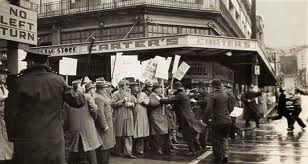 February 15, 1951 was the beginning of the waterfront lockout, followed by solidarity strikes in the rail, coal, drivers and hydro industries. Its effects are still with us.
February 15, 1951 was the beginning of the waterfront lockout, followed by solidarity strikes in the rail, coal, drivers and hydro industries. Its effects are still with us.
The lockout was initiated by the New Zealand government and British ship owners to smash a militant working class willing to taking action for improved wages and conditions. However, the bureaucratic
Federation of Labour would not take the side of the locked out workers, and the watersiders’ union became increasingly isolated.
In April when the anti-worker legislation comes into effect the Council of Trade Unions (CTU) will hold the last of its rallies in response. This will take place under the ‘Fairness at Work’ slogan. Not only does the slogan sound conservative, the political problem with the slogan is that fairness in the workplace requires radical social change. Falling short of being able to achieve radical social change, appropriate working class slogans must be based on concrete claims that can advance the class struggle, such as freedom of association and action at work, specific wage formulations, and daring new mass demands. The use of soft phrases like ‘fairness’ can serve to limit workers’ expectations. Furthermore, ‘fairness’ is not measurable, meaning there is no political accountability for those who promote the use of the slogan.
Like the previous Fairness at Work marches, this April March will naturally be a bureaucratic affair because the working class has been disempowered by previous defeats, including the defeat in 1951. The
‘partnership and productivity’ approach to unionism, which the CTU has actively constructed and engaged in, has helped to further erode working class agency.
Another part of the problem is that at the top of the union movement, the central strategy has become the re-election of the Labour Party rather than the rebuilding of fighting unionism. But where was the
Labour Party for 151 days in 1951?–“Neither for nor against.”
Watch this award-winning documentary ‘1951’ and see how history repeats itself.
Also check out the March and April issues of The Spark which will carry a first-time published major two-part feature on the 1951 struggle.

